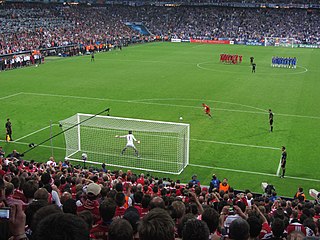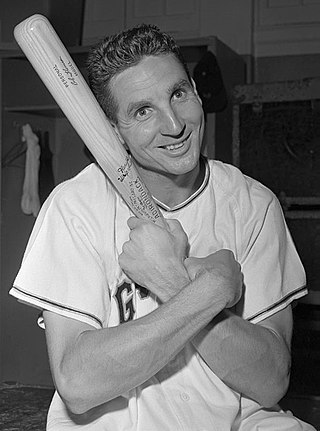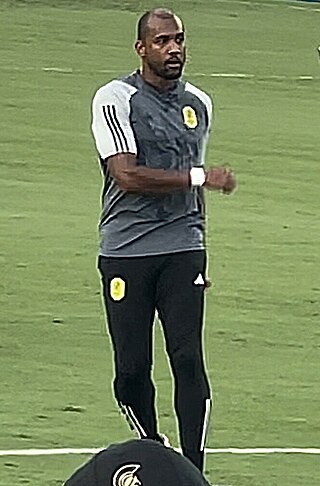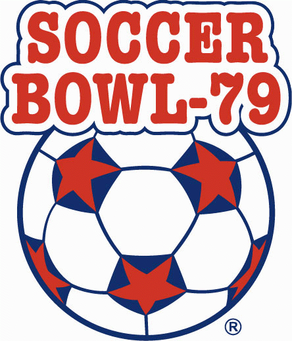
A penalty shoot-out is a tie-breaking method in association football to determine which team is awarded victory in a match that cannot end in a draw, when the score is tied after the normal time as well as extra time have expired. In a penalty shoot-out, each team takes turns shooting at goal from the penalty mark, with the goal defended only by the opposing team's goalkeeper. Each team has five shots which must be taken by different players; the team that makes more successful kicks is declared the victor. Shoot-outs finish as soon as one team has an insurmountable lead. If scores are level after five pairs of shots, the shootout progresses into additional "sudden-death" rounds. Balls successfully kicked into the goal during a shoot-out do not count as goals for the individual kickers or the team, and are tallied separately from the goals scored during normal play. Although the procedure for each individual kick in the shoot-out resembles that of a penalty kick, there are some differences. Most notably, neither the kicker nor any player other than the goalkeeper may play the ball again once it has been kicked.

Thomas Sturges Watson is an American retired professional golfer on the PGA Tour Champions, formerly on the PGA Tour.
In a sport or game, sudden death is a form of competition where play ends as soon as one competitor is ahead of the others, with that competitor becoming the winner. Sudden death is typically used as a tiebreaker when a contest is tied at the end of regulation (normal) playing time or the completion of the normal playing task.

Robert Brown Thomson was a Scottish-born American professional baseball player, nicknamed "the Staten Island Scot". He was an outfielder and right-handed batter for the New York Giants, Milwaukee Braves (1954–57), Chicago Cubs (1958–59), Boston Red Sox (1960), and Baltimore Orioles (1960). His pennant-winning three-run home run for the Giants in 1951 is popularly known as the "Shot Heard 'Round the World", and is one of the most famous moments in baseball history. It overshadowed his other accomplishments, including eight 20-home-run seasons and three All-Star selections. "It was the best thing that ever happened to me", he said. "It may have been the best thing that ever happened to anybody."

The Canada men's national soccer team represents Canada in international soccer competitions since 1924. They are overseen by the Canadian Soccer Association, the governing body for soccer in Canada. They have been a member of FIFA since 1948 and a member of CONCACAF since 1961.

George Edward Pope is an American former soccer player who last played for Real Salt Lake of Major League Soccer and spent eleven years as a defender for the United States national team. He spent most of his career playing for D.C. United. Pope is a member of the National Soccer Hall of Fame.
Paul David Caligiuri is an American former professional soccer player who played as a defensive midfielder.
Joseph Edouard Gaetjens was a soccer player who played as a center forward. Born in Haiti, he represented its national team before and after playing for the United States team in the 1950 FIFA World Cup, in which he scored the winning goal in the 1–0 upset of England.

Ralph Theodore Joseph Branca, nicknamed "Hawk", was an American professional baseball pitcher who played 12 seasons in Major League Baseball (MLB), from 1944 through 1956. Branca played for the Brooklyn Dodgers, Detroit Tigers (1953–1954), and New York Yankees (1954). He was a three-time All-Star. In a 1951 playoff, Branca surrendered a walk-off home run to Bobby Thomson of the New York Giants; the game-winning hit was known as the "Shot Heard 'Round the World".

In baseball, the "Shot Heard 'Round the World" was a walk-off home run hit by New York Giants outfielder and third baseman Bobby Thomson off Brooklyn Dodgers pitcher Ralph Branca at the Polo Grounds in New York City on October 3, 1951, to win the National League (NL) pennant. Thomson's dramatic three-run homer came in the ninth inning of the decisive third game of a three-game playoff for the pennant in which the Giants trailed 4–1 entering the ninth and 4–2 with two runners on base at the time of Thomson's at-bat.

The "shot heard round the world" is a phrase that refers to the opening shot of the battles of Lexington and Concord on April 19, 1775, which sparked the American Revolutionary War and led to the creation of the United States. It originates from the opening stanza of Ralph Waldo Emerson's 1837 poem "Concord Hymn". The phrase has subsequently been applied to the assassination of Archduke Franz Ferdinand in 1914, a catalyst event for World War I, and hyperbolically applied to feats in sports.

Teal Alexander Bunbury is a professional soccer player who plays as a forward for Major League Soccer club Nashville SC. Born in Canada, he played for the United States national team.

The 2010 Lamar Hunt U.S. Open Cup Final was played on October 5, 2010, at Qwest Field in Seattle, Washington, United States. The match determined the winner of the 2010 U.S. Open Cup, a tournament open to amateur and professional soccer teams affiliated with the United States Soccer Federation. This was the 97th edition of the oldest competition in United States soccer. Seattle Sounders FC won the match, defeating the Columbus Crew 2–1 in front of a sellout crowd of 31,311, the highest attendance at a U.S. Open Cup final. Kevin Burns scored first, giving the Columbus Crew an early lead. Sanna Nyassi then scored both goals for Seattle Sounders FC as it became the first team since 1983 to win two consecutive U.S. Open Cup championships.

The 2011 Lamar Hunt U.S. Open Cup Final was a soccer match between the Seattle Sounders FC and the Chicago Fire, played on October 4, 2011, at CenturyLink Field in Seattle, Washington. The match was the culmination of the 2011 U.S. Open Cup, a tournament open to amateur and professional soccer teams affiliated with the United States Soccer Federation. This was the 98th edition of the U.S. Open Cup, the oldest ongoing competition in American soccer. The Seattle Sounders FC won by defeating the Chicago Fire 2–0 with goals scored by Fredy Montero and Osvaldo Alonso. The attendance was 36,615, breaking the record for the final set the previous year when Seattle also won and hosted. Seattle became the first team since 1968 to win three consecutive U.S. Open Cup championships and the fourth team ever to do so in the 98-year history of the tournament.
Soccer in the United States has a varied history. Research indicates that the modern game entered the country during the 1850s with New Orleans' Scottish, Irish, German and Italian immigrants. Some of the first organized games, using modern English rules, were played in that city.
Footgolf is a sport in which players kick a football into a cup in as few shots as possible. The name is a portmanteau of football and golf, and the game combines the two sports, being more closely related to golf.

Soccer Bowl '79 was the championship final of the 1979 NASL season. The National Conference champion Vancouver Whitecaps played the American Conference champion Tampa Bay Rowdies. The match was played on September 8, 1979, at Giants Stadium, in East Rutherford, New Jersey. This was the second straight year that Giants Stadium hosted the Soccer Bowl. The Whitecaps won the match, 2–1, to claim their first North American championship.

The "Shot heard round the world" is a term used in reference to one of the most historic goals in U.S. soccer history, which allowed the U.S. national team to make it to the 1990 FIFA World Cup after 36 years of failed attempts to qualify. This goal was scored in the qualification game between Trinidad and Tobago and United States on November 19, 1989 in Port of Spain.

The Echoing Green: The Untold Story of Bobby Thomson, Ralph Branca and the Shot Heard Round the World is a nonfiction book written by Joshua Prager and originally published by Pantheon Books in 2006. The book centers on the 1951 New York Giants scheme to read opposing catchers' finger signals relayed from catcher to pitcher with a telescope in the center-field clubhouse during the latter part of the 1951 Major League Baseball season. This led to baseball's famous Shot Heard 'Round the World, when Bobby Thomson hit a three-run homer in the bottom of the ninth inning against Brooklyn Dodgers pitcher Ralph Branca, resulting in winning the three game playoff series and the National League (NL) pennant, with a 5–4 win over the Dodgers. "It's been described as the greatest baseball game ever played, and you don't have to be a baseball fan to mark the anniversary." The book expands on an article that Prager wrote in 2001 for the Wall Street Journal.












